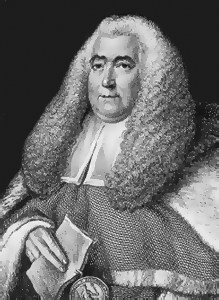
RBH Home
Maps & Travels
Articles
Legends
Towns & Villages
Castles & Houses
Churches
Biographies
Gentry
Family History
Odds & Ends
Mail David
 Sir William Blackstone
Sir William Blackstone(1723-1780)
Born: 10th July 1723 at Cheapside, London
Head of New Inn Hall, Oxford
Died: 14th February 1780 at Wallingford, Berkshire
Sir
William was a Judge of the Court of Common Pleas from an old
Wiltshire family. His father, Charles Blackstone, was a prosperous London
tradesman, while his mother, Mary, was the eldest daughter of Lovelace
Bigg Esq of Chilton House
at Leverton in Hungerford.
He was
born in Cheapside, educated at Charterhouse and Pembroke College, Oxford,
and elected a fellow of All Souls in 1744. He was a good classical
scholar, something of a poet, well read in English literature, and was
called to the Bar in 1746. He had not a great practice, but got the
Recordership of Wallingford, and passed much of his life in the College of
which he was an excellent Steward and Bursar. He also did much to reform
the (then) inefficient administration of the Clarendon Press.
In
his thirtieth year, being disappointed of the Chair of Civil Law, for
which he had been recommended to the Crown, be began, at the suggestion of
the Solicitor-General, afterwards Lord Mansfield, to deliver a course of
lectures on English Law, and these were so successful that he became the
first occupant of the newly founded Vinerian Professorship in 1758. His
success also brought him practice, a seat in the House of Commons and the
Headship of New Inn Hall, Oxford, in 1761. The first volume of his ’Commentaries
on the Laws of England’ appeared in 1765, being the enlarged
substance of his lectures, the fourth and final volume came in 1769, and
edition after edition followed down to the middle of the nineteenth
century. It was the first time that English Law had been made readable and
intelligible to the lay mind. The book was quoted in the Courts and
treated almost as an authority. The rising tide of the appeal to 'Natural
Rights' as against precedent, which foreshadowed and accompanied the
French Revolution, led the new school of jurists, headed by Bentham and
Austen, to discredit the work as having in it no 'original philosophy of
Law' - a property which its author might well have asked his critics to
define. Blackstone was not, indeed, a great Civilian and did not pretend
to be. He was only the most lucid and harmonious expositor of the English
Systems that ever lived. It has been said in more recent times that the
Commentaries “summed up and passed on the Common Law, as developed
mainly by the work of the legal profession, before it was remodelled by
direct legislation”.
Blackstone
retired from his Professorship and Headship, in 1766, and was made a Judge
of the Court of Common Pleas in 1770. He was not by any means a great
judge, being unfitted by temperament and habit for quick decisions. He
spent the last twenty years of his life with his family in Castle Priory
House which
he built at Wallingford and which still stands as an hotel with its lawn sloping down
to the river. His fine statue by Bacon in the Library of All Souls seems
to dominate that magnificent room, to the enrichment of whose shelves he
largely contributed. If it is true that in his later life he became both
irritable and heavy, it is certain that, during the eighteen years spent
in his beloved College, he was the most genial and delightful of
companions.
Edited from
Emery Walker's "Historical Portraits" (1909).
